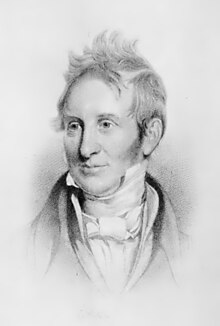Mountstuart Elphinstone
Jump to navigation
Jump to search

Mountstuart Elphinstone FRSE (6 October 1779 – 20 November 1859) was a Scottish statesman and historian, associated with the government of British India. He later became the Governor of Bombay (now Mumbai) where he is credited with the opening of several educational institutions accessible to the Indian population. Besides being a noted administrator, he wrote books on India and Afghanistan. His works are pertinent examples of the colonial historiographical trend.
Quotes[edit]
- "Neither in the Vedas, nor in any book .. .is there any allusion to a prior residence ... out of India ... There is no reason whatever for thinking that the Hindus ever inhabited any country but their present one."
- History of India, 1841 as quoted in Londhe, S. (2008). A tribute to Hinduism: Thoughts and wisdom spanning continents and time about India and her culture
- In the Surva Siddhanta is contall1ed a system of trigonometry which not only goes beyond anythll1g known to the Greeks, but involves theorem which were not discovered in Europe till two centuries ago." 352
- Josyer, G R Sanskrit Civilization Coronation Press, Mysore. p. 2 as quoted in Londhe, S. (2008). A tribute to Hinduism: Thoughts and wisdom spanning continents and time about India and her culture
- There is no question of the superiority of the Hindus over their rivals in the perfection to which they brought the science. Not only is Aryabhatta superior to Diaphantus (as is shown by his knowledge of the resolution of equations involvll1g several unknown quantities, and in general method ofresolvll1g all indetermll1ate problems of at least the first degree), but he and his successors press hard upon the discoveries of algebraists who lived almost in our own time!
- Elphinstone, Mountstuart History of India London: John Murray published in 1849 p. 131. as quoted in Londhe, S. (2008). A tribute to Hinduism: Thoughts and wisdom spanning continents and time about India and her culture
- It is opposed to their foreign origin, that neither in the code of Manu nor I believe in the Vedas, nor in any book that is certainly older than the code, is there any allusion to a prior residence or to a knowledge of more than the name of any country out of India. Even mythology goes no further than the Himalayan chain in which is fixed, the habitation of Gods. It is unthinkable and beyond all canons of logic and common sense that the Hindus had forgotten their original home even at the time of the composition of the earliest Vedas. Christians look to Jerusalem for the origin of their religion, Muslims to Arabia, and Jews to Palestine, but the Hindus have all their sacred places within India itself. If they really had come from outside India, they should have some place of pilgrimage like Mecca or Benares.
"To say that it (emigration) spread from a central point is a gratuitous presumption and even contrary to analogy for emigration and civilization have not spread in a circle but from east to west."
- Such arguments were by no means uncontested. In 1841, Mountstuart Elphinstone objected that "it is opposed to their foreign origin that neither in the code [of Manu] nor, I believe, in the Vedas, nor in any book . . . is there any allusion to a prior residence or to a knowledge of more than the name of any country out of India." Responding to some of the arguments that had been brought forward, he argued that "to say that [the original language] spread from a central point is a gratuitous assumption, and even contrary to language; for emigration and civilization have not spread in a circle." As far as he was concerned, "the question, therefore, is still open. There is no reason whatever for thinking that the Hindus ever inhabited any country but their present one, and as little for denying that they may have done so before the earliest trace of their records or tradition" (97-98).
- quoted in Bryant, E. F. (2001). The Quest for the Origins of Vedic Culture : the Indo-Aryan migration debate. Oxford University Press. ch 1
